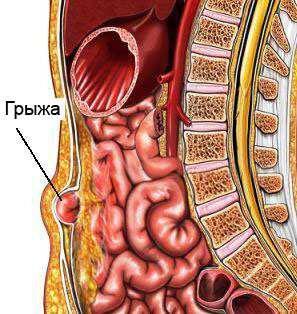Abdominal hernia – Femoral hernia – Inguinal hernia
Description abdominal hernia
The abdominal wall is approximately in the center of the body. It begins just below the rib cage and terminates in the pelvis. The wall supports the intestines and other organs in the abdominal cavity. When the wall is weakened connective tissue, may break. Intestines or other organs can bulge through the gap. This is an abdominal hernia. There are several types of abdominal hernias, called depending on their location:
- Femoral hernia – gaps in the upper thigh
- Inguinal hernia – discontinuities in the groin
- Abdominal wall defects – appear, when the abdomen does not fully develop;
- Umbilical hernia – develops near the belly button;
- Epigastric hernia – It develops in the upper part of the abdominal wall (from the navel and breasts);
- Diaphragmatic hernia – a birth defect in the muscle between the chest and abdominal cavities;
- Hiatal hernia, develops near the upper abdomen;
- Ventral hernia – growing together, where there incision after surgery.

Causes of hernia
Hernias can occur in adult or present at birth.
Acquired hernias can result from:
Poor healing of cuts after surgery:
- Ventral hernia;
- Incisional hernia.
Heavy lifting:
- Laparocele;
- Inguinal hernia;
- Femoral hernia;
- Epigastric hernia, including liver hernia;
- Spiegel hernia.
Injuries:
- Hiatal hernia (often as congenital hernia).
Congenital hernias or those present at birth can include:
- Umbilical hernia (the most common hernia in children);
- Inguinal hernia;
- Femoral hernia;
- Hiatal hernia;
- Diaphragmatic hernia;
- Spiegel hernia.
There are also other causes of hernias.
Risk factors for abdominal hernias
These factors increase the chances of hernia.
Factors, increase the risk of hernia:
- Hernias occur more often in men;
- The infection in the incision after surgery.
Actions, that cause abdominal strain:
- Heavy lifting
- Cough
reason for the appearance of hernias can be:
- Pregnancy;
- Obesity;
- Asthma;
- Constipation;
- Chronic obstructive pulmonary disease.
Risk factors of congenital hernias include heredity.
Hernia symptoms
Most hernias can be found on the convexity on the surface of the wall bryshnoy. Sometimes a congenital hernia becomes visible, when the baby is crying. Other symptoms may not appear.
Some people feel tenderness or discomfort, in the place, where the hernia.
Diagnosis of abdominal hernia
The most common method of diagnosis is palpation and percussion. It is also widely used ultrasound (US).
Treatment of abdominal hernia
Most inguinal hernias increases with time. Large hernias can put pressure on surrounding tissues. This pressure causes pain.
Strangulated hernia is the most serious complication. It happens, When bowel loops becomes clamped in the abdominal wall. It, in turn, It can lead to intestinal obstruction. Infringement may also occur, If the blood flow slows down. Strangulated hernia requires emergency medical operations.
Hirurgcheskoe treatment
Hernias are well treated by surgical intervention. During the operation, part of the bulging intestine is put in place. Damaged wall sutured. In some cases, a special mesh vstaplyaetsya, to further strengthen the abdominal wall.
Your doctor may suggest hernia treatment via laparoscopic surgery. The surgical site is very small incisions are made. Through these incisions are introduced miniature surgical instruments. Thereafter, the surgeon proceeds to operate. Through the laparoscope monitored the progress of the operation. After a successful operation, all tools are removed, and made stitching cuts. Since the size of the incision is small, its very easy to sew. After a laparoscopy is recommended lie down..
Prevention of abdominal hernia
Appearance of congenital hernias can not be avoided. To reduce your chances of poyavleniegryzhi in adulthood, you must take the following steps:
- Avoid the appearance of excess weight;
- Do not lift heavy objects;
- Eat foods, rich in fiber;
- Do not smoke (smoking can cause chronic cough).
